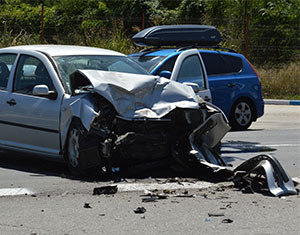Atlanta Attorney for Traumatic Brain Injury Victims Due to Third-Party Negligence
Our goal as injury lawyers is to fight on behalf of those affected by traumatic brain injuries (TBI) caused by the careless or criminal actions of others. It’s about accountability, but it’s also about ensuring survivors are financially prepared for the next chapter.
Stephen D. Apolinsky and our Atlanta traumatic brain injury attorneys have successfully obtained compensation for individuals who’ve suffered serious, debilitating, and lifelong injuries. At Apolinsky & Associates, LLC, we understand the many ways in which a traumatic brain injury can completely upend your life. When it comes to your case, our attorneys will fight hard to ensure you are fairly compensated.
What is a Traumatic Brain Injury?
A traumatic brain injury, or TBI, is an injury usually caused by a violent blow to the head. These injuries are oftentimes caused by negligence on the part of another party. In other words, the irresponsible actions of another individual are often the cause of a victim’s TBI.
Some of the most common accident types that can result in a traumatic brain injury include:
- Motor vehicle accidents (cars, trucks, motorcycles, bicycle & pedestrian accidents, etc.)
- Physical assault
- Struck by/against something (i.e. sports-related injuries, falling merchandise, construction accidents, work accidents, etc.)
Long-Term Impact of Traumatic Brain Injuries
Damage to the brain can significantly impair an individual’s life and certainly qualifies as catastrophic. Individuals who survive a traumatic brain injury may suffer long-term effects as a result of their injury, such as:
- Cognitive difficulties
- Immense pain
- Paralysis
- Personality changes
- Reduction or loss of muscle control
- Loss of sexual function
- Diminished or loss of bladder and bowel control
Per the CDC, moderate to severe brain injuries are a lifelong condition, and can lead to a life expectancy that is reduced by about 9 years. Many TBI sufferers find it difficult or impossible to return to work. In severe cases, TBI patients may need round-the-clock medical care and physical assistance.
Of course, the stress, emotional turmoil, caregiving duties, and financial strain stemming from a traumatic brain injury can also take an immense toll on the physical and mental health of the TBI patient’s family members. Spouses and children, especially, are deprived of the family relationship they came to rely on from the person who was injured. Frankly, they may feel they’ve lost their loved one, even while they’re still living.
Proving Negligence & Causation in a Traumatic Brain Injury Case
Negligence can refer to a wide range of actions or failures to act. For example, if your TBI occurred as the result of a car accident, the other driver may have been negligent if they caused the crash while operating their vehicle unsafely by speeding or drinking and driving. If your TBI was sustained during a slip and fall accident, you might seek to show the site of the injury was unreasonably dangerous, despite the property owner’s duty to maintain a safe premise.
Negligence can be broken down into four simple parts which the plaintiff (person injured) must prove:
- The person named in the suit (the defendant) owed you a duty of care.
- The defendant breached the duty of care owed to you through an act of negligence.
- The breach of the duty of care was the legal cause of your injuries.
- The plaintiff suffered damages (losses) as a result of the accident.
When the negligence of another person causes or contributes to the cause of a traumatic brain injury, it can be grounds to pursue financial compensation. Claims for damages in TBI cases commonly involve:
- Car accidents.
- Truck accidents.
- Construction accidents.
- Defective products.
- Dangerous conditions on another’s property (including foreseeable violence).
Negligence is understood to be the absence of ordinary care (when one has a legal duty to exercise it) resulting in serious injuries to another. Although we frequently use the word “accident,” the reality is that so many of the circumstances that lead to Atlanta traumatic brain injuries involve careless actions resulting in preventable consequences.
Establishing negligence doesn’t mean proving the other person meant you harm. Rather, it means showing that the injury was caused or exacerbated by a failure to exercise ordinary diligence, as defined in O.C.G.A. 51-1-2.
The question of whether you are able to pursue damages will also hinge partially on the ability of the responsible parties to pay. For example, if your TBI resulted from a violent attack, you may have a viable claim for intentional tort against the perpetrator. However, unless that individual is independently wealthy, you may have a tough time collecting anything. (This is partly why victims of violence often pursue third-party premises liability claims against property owners, often prevailing on legal theories like negligent security.) This should factor into your decision to pursue a claim.
A TBI results in myriad losses for the affected individual and their family. This includes medical expenses, lost wages, an inability to care for oneself, pain and suffering, and more. In many cases, it is possible to recover some amount of compensation if you can establish that another’s negligence caused or contributed to your injuries.
Further Reading: Understanding Negligence Per Se in Georgia Personal Injury Cases
Compensation & Damages Recoverable in a Traumatic Brain Injury Lawsuit
It is imperative to contact an attorney as soon as possible in cases of traumatic brain injury. With very few exceptions, Georgia’s statute of limitations gives you just two years from the cause of action (usually the date of the accident that caused the TBI) in which to file a legal claim for damages, per O.C.G.A. 9-3-33. Failure to take action in that window may result in forever closing the door on the chance for financial compensation for your traumatic brain injury.
Injured victims deserve financial compensation that is equivalent to the full value of their losses. In Georgia, personal injury compensation is available for both direct economic losses and intangible (noneconomic) damages. Most personal injury cases are defended by corporations or big insurance companies, and these companies will always fight aggressively to deny claims or limit settlement offers.
Securing high-quality legal representation improves your chances of obtaining full and fair compensation. Our traumatic brain injury lawyers help victims seek recovery for:
- Emergency room costs and ambulance fees.
- Mental anguish.
- All other medical bills.
- Long-term disability (LTD).
- Lost current and future wages.
- Loss of life enjoyment.
- Pain and suffering.
Spouses and/or children may be able to pursue their own claims for loss of consortium.
Note that even if you were partially responsible for your own injury, Georgia follows a system of modified comparative fault with a 50 percent bar. What that means is that you can still obtain compensation for a traumatic brain injury even if you were partially to blame – so long as you weren’t more than 49 percent responsible. If you are deemed comparatively at fault, your damage award will be proportionately limited. Our dedicated injury attorneys fight to ensure this does not happen, or that any evidence of your own liability for your TBI is significantly mitigated.
Further Reading: What is Pain and Suffering and How Is Compensation Value Calculated?


















